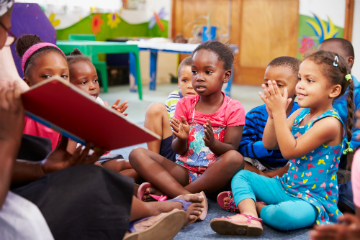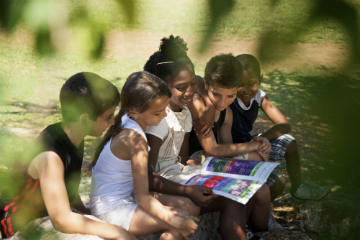Making our schools safe for every learner
To provide our children with a full and rewarding education, we need to make sure that they’re able to learn in a safe and comfortable environment. However, learner safety isn’t limited to keeping children safe at school during school hours. It also means being aware and involved in their activities before and after the school bell rings.

Ensuring safe schools
With a budget of R33 million for the 2019/2020 financial year, key elements of the school safety initiative to make our schools safer for our children, include:
- Physical security - fences, burglar bars, windows ‘stone’ guards (for vandalism), alarms, access control, armed response, guards, and patrols.
- Social environment - youth development, after-school activities, holiday programmes, counselling, truancy interventions, and community mobilisation.
- Plans, policies and procedures - school-based policies, district and provincial policies, safety procedures, planning support on all levels, and training interventions.
We want to ensure the safety of our children throughout the school day – before, during and after classes.
Before school
The Walking Bus initiative aims to create a safe and supervised route for learners to and from school every day with the commitment and involvement of the community, local law enforcement, SAPS, school principals and support staff to help create safer environments.
The Walking Bus initiative will see members of the broader community or parents volunteering to walk groups of children to School and back home in the afternoon again and also at the same time keeping a lookout on the perimeters of their School. These groups walk with the children along the most convenient and desirable routes leading to the School. Groups meet up with each other at specified points on route to the School and move between Streets within their specific areas.
Our aim is to give parents the peace of mind that their children are safe when travelling to school and we do this by helping our schools and communities to make safety a priority in their community, and we will achieve this with every Walking Bus initiatives that will be rolled out in the weeks and months to come.
Find out more about our Walking Bus initiative
During school
Our Safe Schools Programme works with schools to develop and implement safety plans, introduce security mechanisms and mobilise community support for successful teaching and learning.
 We also help our schools to implement developmental programmes, including life skills for learners at risk to prevent possible problems, or cope better with existing situations related to:
We also help our schools to implement developmental programmes, including life skills for learners at risk to prevent possible problems, or cope better with existing situations related to:
- teenage pregnancy,
- sexuality,
- sexual abuse,
- drug abuse,
- gender inequality,
- gender-based violence,
- bullying,
- HIV and AIDS,
- racism and
- other social problems.
Each of our schools must have a safety committee responsible for implementing a safety plan, assisted by our Safe Schools District Coordinators and Safe Schools fieldworkers (SSFW) in every district.
School Safety committees (SSC) and school governing bodies (SGB) receive training in Occupational Health and Safety, which includes training in first aid and firefighting as well as the development of safety and evacuation plans. Key elements include access control, playground monitoring, monitoring of security infrastructure, and emergency procedures.
The SSFW helps with the following:
- Youth development, which includes the establishment of youth clubs to address the major challenges facing the learning sites and communities (such as gangsterism, abuse, crime, racism, teenage sexuality, vandalism and burglaries). These programmes are offered on Holiday and After School programmes which are planned across the province.
- Identification of hazards and helping to reduce risk by advising and supporting each school’s SSC in improving and maintaining school safety through emergency preparedness planning, security audits and assessments and special safety programs or presentations.
- Working closely with law enforcement, including SAPS, to effectively coordinate safe schools initiatives, and report school crime and violence to the Safe Schools call centre and district office.
- Assisting the school by investigating the allegations of truancy through home visits in order to determine if the absence from school is a result of illness, gang intimidation, academic challenges or any other reason.
Report any incidents that compromise school safety to our Safe Schools call centre at:
- Tel: 0800 45 46 47 (Toll-free)
- Mondays to Fridays between 7.30am and 4pm (thereafter a voice message gives specific option prompts).
- Weekend calls are also recorded and responded to on Monday mornings.
The Safe Schools call centre will ensure that your school is supported by the relevant emergency agency and that you receive information about psycho-social support. They also provide online debriefing and counselling support for our learners and educators who may be experiencing any form of abuse, as well as points of contact for schools needing to report incidents of crime.
After school
 As part of our After-school Game Changer we aim to provide our learners from no-fee schools with access to safe, quality after-school programmes.
As part of our After-school Game Changer we aim to provide our learners from no-fee schools with access to safe, quality after-school programmes.
The programmes offered fall under 4 pillars:
- Sport & Recreation,
- Academic Support (including eLearning),
- Arts & Culture and
- Life Skills.
We believe that regular and consistent participation of learners in these programmes will dramatically improve learner outcomes, reduce school dropout rates and reduce risk-taking behaviour.
An integrated approach to youth development
We want to help our youth realise their full potential and in order to do this we’ve put together various programmes and initiatives, including:
The YDS has opened the way for projects like our Youth Cafés which offer skills development programmes.
The Mass participation; Opportunity and access; Development and growth (MOD) Programme aims to create a socially inclusive, creative and active Western Cape.
Apply for this programme if you’d like to tutor primary and high school learners. Year Beyond is an educational outreach programme that aims to assist underperforming schools, while giving you the opportunity to gain new skills.
Conclusion
We realise that we’ll only be able to achieve this through a whole-of-society approach where our provincial government works in partnership with municipalities, NGOs, the private sector, principals, teachers and most importantly, parents and learners. This is what we mean when we say “Better Together”.
We encourage all parents to enquire at their children’s school about the after-school programmes on offer and ensure that their child attends these on a regular basis and to use the opportunities available to them, to interact with government so that we stay responsive to your needs, and to make the best decision for your own future through taking responsibility for how you invest your time and energy.



